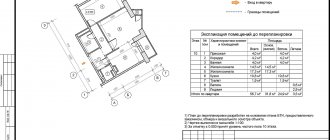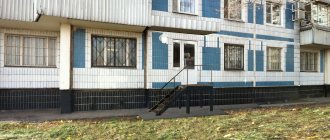The concept of "communal apartment"
Today, such a definition as “communal apartment” is common in everyday life. But if we analyze modern legislation, this concept has no legal force. Therefore, when disclosing this housing issue, the term “communal apartment” should be used.
What is a communal apartment? One of the obvious disadvantages of the modern housing complex of the Russian Federation is that it does not clearly define the concept of a communal apartment. This leads to the emergence of numerous ambiguities and contradictions in the legislation, in particular, codes and laws in force in the territory of individual constituent entities of the Russian Federation.
Many lawyers and scientists have attempted to interpret the concept of a communal apartment, but even the most experienced lawyer will not dare to give an exact definition of this category of housing. If we analyze all the accumulated theoretical experience, we can derive a generalized definition.
A communal apartment is an apartment that consists of several rooms owned either under a social lease agreement or by right of ownership. At the same time, the key factor in communal living is the presence of two or more owners.
Of course, such an interpretation is formal in nature, but despite this, it does not contradict the RF LC. In addition, this point of view is confirmed by the classification of communal apartments, which is recorded in the Housing Code:
- apartments, living rooms that are used by tenants for living after the official conclusion of a social rent agreement with the state;
- apartments divided into rooms that belong to the owners by right of ownership;
- mixed-type apartments, which mean that both tenants under a rental agreement and the owners of the rooms live under one roof.
Lawyer and real estate expert Svetlana Kirillova answers:
The first question: how is a room in which there is no natural light, that is, a window, recognized as residential? I suspect that the apartment was remodeled, which was not legalized.
Resolving the issue of housing redevelopment always begins with a request for technical accounting documents: this is a technical passport of the apartment, a floor plan and an explication. Based on these documents, one can draw a conclusion about the approved purpose of the premises in the apartment, their original area, and the location of the partitions. If this room is indicated as non-residential, then you can expand the bathroom using it. If initially there was a strange layout with a living room without a window, then the question is ambiguous.
Is it possible to legalize sinks in bedrooms?
Is it possible to tear down a wall in an apartment and install a new one?
Second question: where according to the plan is the bathroom and, accordingly, the riser located? Transferring the so-called wet zones is not possible to every corner of the apartment. If the riser is directly adjacent to this room, such a project can be considered. If it is located far away and the pipes need to be routed through other rooms in the apartment, especially residential ones, such a project will not be approved.
It is impossible to give competent advice on the issue of redevelopment without seeing the original technical documentation and redevelopment plan. We can only talk about general rules. In addition, in each region of the Russian Federation, and what about the region, in each district of the Moscow region, the requirements for remodeling an apartment may vary.
The question of recognition of this premises by the Ministry of Defense was raised incorrectly. MOPs are common areas in an apartment building. There cannot be a MOP in an individual apartment. If it is possible to coordinate the redevelopment with the transfer of the bathroom to the place of the room, then it will be the bathroom, and not the MOP.
The concept of “common property of a communal apartment”
A communal apartment is not only living rooms, but also additional property that is of a common nature. All residents of a communal apartment, without exception, can use this usable area, since the collective property belongs to them on the right of shared ownership.
The common property of the owners of rooms in a communal apartment implies the imposition of certain rights and obligations on the participants in legal relations. Namely, Article 43 of the Housing Code of the Russian Federation imposes on the owners of rooms the burden of expenses required for the maintenance of common property in a communal apartment.
The financial costs of each owner are calculated using a fairly simple formula. The share of expenses that are mandatory is calculated taking into account the share of common property that is allocated to the owner in accordance with the legislation of the Russian Federation. Accordingly, the greater the share of common property, the greater the owner’s costs for maintaining common property in a communal apartment.
The common property consists of several categories of utility premises:
- kitchen space where collective stoves and plumbing are installed;
- corridors in which owners have the right to install furniture and other property, but without infringing on the interests of neighbors in full accordance with their share;
- bathroom or shower;
- toilet;
- change house and any other utility room.
None of the residents has the right to prevent other residents of the apartment, including tenants, from using common property, which is secured by the right of common shared ownership. In case of such prohibitions, a citizen has the right to appeal to a court, which will determine the legality of such behavior.
Is it possible to smoke
In accordance with the new laws, smoking without restrictions in a communal apartment is only possible in your own room. And the remaining rooms (for example, toilet, balcony) are considered common areas. And Federal Law No. 15-FZ “On protecting the health of citizens from the effects of environmental tobacco and the consequences of tobacco consumption” prohibits smoking in public places.
To avoid conflicts, it is better to discuss with your neighbors where you can smoke. A good option is to install good new exhaust ventilation. Then the smoke will not bother anyone. Especially if there are several smokers.
Ownership of common property in a communal apartment
This aspect of cohabitation is discussed in more detail in Art. 41 Housing Code of the Russian Federation. That is why all practicing lawyers turn to this legal regulation in order to correctly interpret all controversial issues that arise.
According to the presented article, living rooms in a “communal apartment”, which have the status of isolated ones, are recognized by legislative norms as independent objects of property rights. In other words, legal acts oblige the state registration of all residential premises when carrying out legal transactions with the specified type of property and in other cases regulated by the federal legislation of the Russian Federation.
As for the issue of common property, in this case the premises are given the status of common shared ownership. The logical conclusion follows from this rule that state registration of the right to common property in such situations is not provided for by law.
The right of ownership extended to common property in a communal apartment arises due to the fact that the owner has the right of ownership to isolated living rooms.
In addition, it is interesting that a communal apartment itself is not recognized as a separate object of ownership. This rule was derived from the fact that only living rooms are recognized as the object of ownership in such apartments. The rest of the useful property of public use is in shared ownership.
Here another question arises - how is the transfer of a share of common property to the newly created owner carried out? The answer is simple. The right to a share in a communal apartment arises precisely at the moment when the new owner is endowed by law with the right of ownership of the acquired living rooms in the process of purchase and sale, donation, inheritance. In this case, the size of the share of the new owner must fully correspond to the size of the share of the common property of the old owner.
Additional obligations
In the turmoil, we must not forget that common property, shared premises, is not only in the communal apartment, but also in the house where it is located. The rights and obligations of homeowners apply to them according to the same principles.
However, smoking is allowed in the common stairwells.
Common property in residential apartment buildings:
- Premises not intended for living in, without a specific owner assigned to them;
- The roof of an apartment building (the entire roof, not just the areas above the entrances);
- Load-bearing structural elements and fences (slabs for balconies, partitions as walls, the entire list of load-bearing supports, foundation base, etc.);
- Door openings at entrances not to private apartments, objects that act as parapets, railings, windows in technical areas;
- Mechanical systems with special purpose in the field of sanitation and energy supply;
- Territories near the house, including the land on which the building is erected;
- All existing buildings intended for improvement of general household value (boiler rooms, collective parking, sports and children's playgrounds, garages).
The latest changes in legislation may not have been reflected in this article, and therefore the article may have lost its legal relevance. If you have any questions, be sure to contact our lawyer for a free consultation using the form below.
Payment of rent for residential premises is the responsibility of all owners and tenants of residential apartments. The methods for calculating rent in a communal apartment differ from calculating the amount of payment in ordinary apartments due to the presence of common areas, the maintenance of which must be paid for by all co-owners of communal housing.
Restrictions imposed on room owners in communal apartments
The legislation of the Russian Federation establishes the principle that the fate of a share in a communal apartment in common property completely copies the ownership of the residential premises. In other words, it is impossible to alienate a share regardless of the room in a communal apartment. This rule is also confirmed by the fact that common property cannot appear in civil circulation as an independent object of property rights.
It is also impossible to alienate individual parts of the usable area of common property, which is regulated by law as shared property. The only thing that the owners of living rooms can do is to add common property to their property. Such modifications occur through redevelopment, refurbishment and reconstruction of premises.
Actions aimed at changing the property of collective use through redevelopment may cause the area of common use to be reduced in size.
In order not to violate the legitimate interests and rights of other citizens living in a communal apartment, the owner must obtain written consent from all homeowners. Only in such a case will codification actions in common shared ownership be recognized as legal.
In addition, redevelopment and refurbishment of common property in communal apartments in order to improve living conditions can occur by decision of all owners. An example is the case when the owners want to expand the kitchen by adding some corridor area. However, such transformations will be recognized as legal only if it is possible to obtain permission for such capital actions from local self-government bodies. To do this, at the place of request, you must provide a package of documentation specified by the Housing Code of the Russian Federation.
If local self-government bodies do not issue permission for reconstruction or redevelopment, then any changes will be considered uncoordinated. This will entail the imposition of liability on the owners, in particular, the court may oblige the owners to restore the previous appearance of the common property before the installation actions were carried out. At the same time, the period for restoration work is set at the discretion of local self-government bodies, since legislative acts do not provide any clear explanation in this regard.
Author of the article
My neighbor doesn't pay utility bills, what should I do?
It happens that one of the neighbors does not pay their share for utilities. Or, for example, 3 people live in a room, and two of them are unregistered. And the share of the payment is calculated only for one person. What to do in this case?
The main thing you need to understand is that the remaining tenants should not pay other people’s debts. And according to the law, no one can force them to do this.
You can turn off electricity, water and gas for non-payment if it is possible to turn them off only in a separate room. After all, the rest pay their bills regularly.
The best solution would be to install separate indoor meters. In some cities (Moscow, St. Petersburg), if such meters are available, receipts for communal apartments arrive separately for each owner.
If indoor meters are not installed, then all that remains is to apply to the court against the defaulter.
You can request a sample application. ⇐
Features of living in communal housing
How to solve the problem of living together in a communal apartment? Photo No. 4
Read more: Supply-side inflation may result from
To summarize today's material, let's look at some of the nuances of living in a communal apartment. Most of them have already been discussed in the material presented above, but some features were not highlighted.
Perhaps the most important of these is that it is not so difficult to avoid any problems while living in a communal apartment - it is enough to draw up an agreement agreed upon with all residents of a communal apartment that regulates the rules of living in it.
So, for example, in such an agreement you can define:
- procedure for using public places;
- smoking ban;
- principles of payment for utilities;
- time for visiting guests;
- and many other aspects of the life of all residents that will be convenient for everyone.
It is worth understanding that it is advisable to resolve all controversial issues peacefully, but if this is not possible, then you cannot do without going to court. When resorting to legal proceedings, it is important to take into account the seriousness of such events and carefully prepare for them. Otherwise, achieving success in court will be problematic.
In general, living in a communal apartment is not so difficult if you know all your rights and obligations. Every citizen must adhere to the basic rules of behavior and living in this type of housing, otherwise there is a risk that he will be forcibly evicted. We hope the material presented above was useful to you. Good luck in defending your rights!
In this video you can find out how issues of living together in a communal apartment were resolved during the Soviet era, and perhaps learn some advice for yourself from it:
Rights to a vacant room
If one of the rooms is vacated, it can be transferred by inheritance or as a gift to the owner's heirs . If we are talking about a room owned by the municipality, then the vacated premises can be transferred on the basis of a social tenancy agreement to certain categories of citizens:
- users who are registered to receive their own housing. They are the ones who are given rooms in communal apartments;
- low-income citizens and other privileged categories of the population;
- users whose relocation is taking place within the framework of the program for the resettlement of dilapidated buildings;
- citizens who expressed a desire to buy a room from the municipality.
Read more: Forgot to sign a contract at the site, what to do
If the rights of those living in a communal apartment and the rules of residence are violated, where to complain, how to write a complaint
Often life in a communal apartment is accompanied by conflict situations. As statistics show, in the vast majority of situations, neighbors in a communal apartment cannot find a common language, and law enforcement officers often have to intervene.
If the question arises where to complain, then you need to indicate that conflicts in communal apartments are resolved with the participation of the police or the courts. If a neighbor violates your rights, no one can stop you from fighting him and writing a complaint. It will need to indicate the circumstances of the conflict that occurred, carefully describe your actions and the neighbors’ reaction to the claims, and also provide evidence. This includes various photographs and video materials, witness statements, etc.
If a neighbor occupies a common area
If a neighbor has unauthorizedly seized part of the common premises, it is necessary to file a lawsuit. Since common areas are divided between the owners according to shares, and their use is carried out on equal terms, the neighbor will be held accountable. In particular, he will be forced to vacate the territory that he occupied in circumvention of the current rules, dismantle all structures that violate the rights of other residents, etc.





